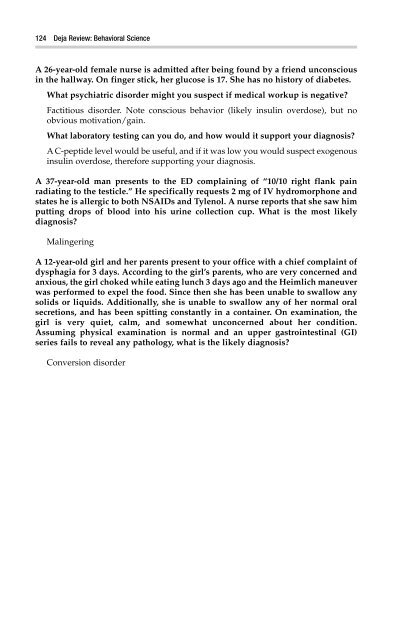Behavioral Science
Create successful ePaper yourself
Turn your PDF publications into a flip-book with our unique Google optimized e-Paper software.
122 Deja Review: <strong>Behavioral</strong> <strong>Science</strong><br />
FACTITIOUS DISORDER<br />
What is the primary characteristic<br />
of factitious disorder?<br />
Are patients with factitious disorder<br />
or malingering aware of the false<br />
nature of their somatic complaints?<br />
How is factitious disorder different<br />
from malingering?<br />
Which gender is more prevalent<br />
in factitious disorders?<br />
What occupation has the highest<br />
prevalence of factitious disorders?<br />
What disease presentations are often<br />
seen in factitious disorder?<br />
What laboratory finding would indicate<br />
self-injection of insulin?<br />
What are common behaviors seen in<br />
patients with factitious disorder?<br />
What are common histories of patients<br />
with factitious disorder?<br />
What is the appropriate treatment<br />
for factitious disorder?<br />
What is the prevalence of factitious<br />
disorder?<br />
Which gender is most commonly seen<br />
in factitious disorder?<br />
What is a well-known variant<br />
of factitious disorder?<br />
Intentional simulation of illness<br />
Yes. This is the distinguishing<br />
characteristic between factitious<br />
and somatoform disorders.<br />
The only obvious conscious goal of<br />
factitious disorder is to assume the “sick<br />
role”—there is no clear benefit or gain.<br />
Female<br />
Health-care workers<br />
Hematuria (from adding blood to urine<br />
or from the use of anticoagulants) and<br />
hypoglycemia (from insulin injection)<br />
Low C-peptide level<br />
Requests for analgesics<br />
Extensive knowledge of medical<br />
terminology<br />
Eager desire to undergo medical<br />
procedures and operations<br />
Traveling to different locations,<br />
hospitals, emergency rooms, etc<br />
Patients often have dramatic histories<br />
with extensive details about their<br />
symptoms.<br />
Recognition and confrontation in a<br />
nonaccusatory manner<br />
0.5% to 0.8%—very difficult to determine<br />
Females<br />
Factitious disorder by proxy (aka<br />
Munchausen syndrome by proxy)



